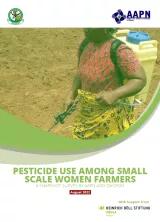Pesticide Use Among Small Scale Women Farmers
Content is no longer being updated
Small-scale women farmers play a significant role in Nigeria’s agricultural sector; they make up 70% of the workforce and produce 60% of the food Nigerians consume. Many of them depend on synthetic chemical pesticides in their farm activities, mostly based on conventional farming methods.
In conventional agriculture, pesticides are a central tool used to control insects, weeds and diseases. With their use, farmers seek to increase productivity by minimizing crop losses. Despite these benefits, pesticides have many harmful human and environmental impacts, including on biodiversity, water and soil health.
Research studies have shown that most small-scale farmers in Nigeria have little knowledge about the associated health and environmental implications of the pesticides they use, nor do they know about their local and international regulatory status. As a result, they are unable to take requisite precautions to protect their health and environment. Where awareness of the adverse impacts of pesticides exists, farmers often lack the resources to buy the necessary
personal protection equipment.
Because of the central role women continue to play in most families and households, pesticide-related dangers small-scale women farmers encounter are likely to affect not only themselves but also their children and family. They should therefore be able to evaluate pesticide risks and make an informed decisions on food and human safety every day.
Against this backdrop, the Smallscale Women Farmers Association in Nigeria (SWOFON) conducted a snapshot survey among its members to find out which pesticides most women use. The survey covered 107 women farmers in four states.
